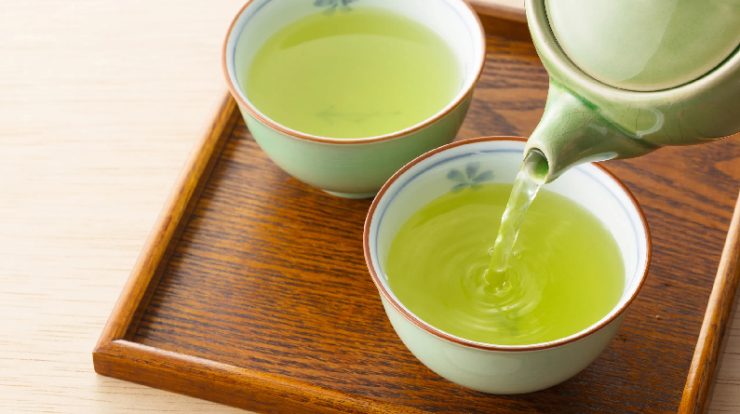
Green tea’s calming flavour and therapeutic benefits have been appreciated in China and Japan for thousands of years. Green tea’s health benefits have been studied extensively, and studies have shown it can do everything from reduce the risk of heart disease to aid in the control of type 2 diabetes to promote stronger bones. According to research published in 2019 in Molecules, green tea is prepared using the same leaves as black tea; the only difference is that the green tea leaves are not fermented. It’s possible that the tea’s purported health benefits can be attributed to the fact that this process keeps the tea green while also increasing its antioxidant levels. In this article, we will discuss the potential advantages and disadvantages of drinking green tea and offer suggestions for including it in your diet.
Benefits
Green tea consumption on a consistent basis may aid in the avoidance of or control of certain chronic health conditions. There are many advantages to drinking green tea, according to studies.
Possibility of Benefit to Mental Health
A cup of hot green tea can be very soothing, and there is a chemical reason for this. The amino acid theanine is found in tea and some mushrooms, and a study published in 2021 Molecules suggests that it may:
- Reduce anxiety
- Calm the nerves
- Caffeine is an anxiety fighter.
According to research published in 2016 in Pharmacognosy Magazine, green tea contains significantly more theanine than oolong, black, or white tea. A theanine supplement of 200 to 400 milligrammes daily reduced stress and anxiety in people exposed to stressful conditions, according to a review published in Plant Foods for Human Nutrition in 2020. Another study published in 2019 found that 30 healthy adults who took theanine 200 mg daily for four weeks experienced greater improvements in depression, anxiety, and sleep quality than those who took a placebo. The amounts of theanine used were significantly higher than what you’d find in a cup or two of green tea, but both studies highlight the potential mental health benefits of theanine (approximately 8 milligrammes per cup, according to an article in Food Chemistry).
Maybe Helps Your Memory

Also, the theanine in green tea has been shown to help with memory, according to studies. The working memory of 12 healthy volunteers was found to be enhanced by green tea extract in a 2014 study published in Psychopharmacology. Working memory is a type of short-term memory crucial for many cognitive processes, including planning, comprehension, reasoning, and problem-solving.
Both green tea extract (27.5 milligrammes) and a placebo (a milk-based drink) were administered to the patients. The participants then performed the assigned tasks while their brain activity was monitored using an MRI. Brain connectivity, or the ease with which different parts of the brain communicate with one another, increased in those who ingested the green tea extract, along with gains in working memory and task performance.
The study’s findings should be interpreted with caution due to the study’s small patient sample size. The effects of green tea on memory require additional study. Some studies have shown that consuming green tea can reduce the risk of developing neurodegenerative diseases like Alzheimer’s and Parkinson’s. Because of its high levels of antioxidants, green tea is thought to have these effects. Researchers found that among green, black, and earl grey teas, green tea was the most effective at neutralising free radicals. As a result of oxidative stress, neurodegenerative diseases can develop over time, but antioxidants protect cells from this damage.
After following 1,545 elderly Chinese people with normal brain function for one year, researchers found that those who regularly drank tea, including green tea, had slower rates of cognitive decline than non-tea drinkers. This study was published in 2022 in the journal Frontiers in Nutrition. Even after taking into account variables like education, smoking status, and physical activity levels, this remained true.
See Also: Literacy in Karachi, Pakistan’s Jhuggis (shantytowns)
According to the Centers for Disease Control and Prevention, cognitive decline is one of the earliest signs of Alzheimer’s disease and other forms of dementia (CDC). It’s used to describe cases of confusion and/or memory loss that persist or worsen over time.
Reducing Cholesterol Levels
The Center for Disease Control and Prevention estimates that 38 percent of American adults have high cholesterol levels, putting them at increased risk for cardiovascular disease. A positive development? Perhaps drinking green tea would be useful. Green tea consumption has been linked to lower levels of both total cholesterol and LDL (bad) cholesterol, according to a meta-analysis of 31 studies published in Nutrition Journal in 2020.
Potentially Hypotensive: Can Lower Blood Pressure
Green tea’s potential cardiovascular benefits include both a reduction in blood pressure and cholesterol levels. A 2020 meta-analysis published in Medicine found that green tea significantly lowered blood pressure, especially in those with high blood pressure and the greatest risk of cardiovascular disease. The study included 1,697 people. Damage to the arterial wall caused by high blood pressure is a major contributor to cardiovascular disease and stroke. According to the CDC, this increases the likelihood of plaque buildup in the arteries, which in turn causes these vital blood vessels to become narrowed. High blood pressure can cause kidney failure if not treated.
According to the same 2020 study cited before, green tea’s high antioxidant content may be responsible for its beneficial effects on blood pressure. By lowering inflammation and widening blood vessels, these antioxidants improve circulation. However, the majority of the studies included in the meta-analysis only lasted for three to sixteen weeks, so it is unclear how long-term consumption of green tea may or may not affect blood pressure.
Could Help Avoid Stroke
According to the CDC, stroke continues to be one of the leading causes of death and disability among American adults. Green tea consumption has been associated with a reduced risk of stroke. In 2020, for instance, researchers at Tufts University monitored the tea consumption of nearly 500,000 adult Chinese participants for the American Journal of Clinical Nutrition. Green tea consumption in particular was found to reduce the risk of stroke. The risk of stroke was reduced in proportion to the amount of green tea consumed.

